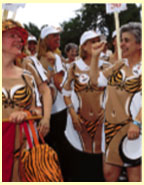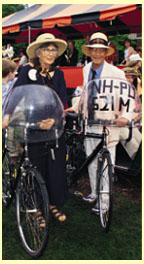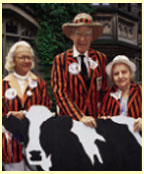|
July 4, 2001 Features
Photographs by Ricardo Barros and Nicholas DiPietro From Elm Drive's gentle slope to Poe and Pardee Fields, some 1,000-plus Class of 2001 members watched and cheered as glimpses of their future - and salutes to Princeton's past - marched before them at this year's P-rade. "Check us out! We look good! This is you in 25 years!" a triumphant Class of 1976 alumnus shouted. "Just wait 40 years. You'll be out here!" Peter Vanderwicken '61 predicted. Russ Moore '46 and Bill Bardsley '51 slowed their gaits to give high fives to those along the curbs. Elliot Rothschild '64 played the politician shaking hands. Al Abbotts '50 handed out pennants, and David Richman '65 filmed the sideliners. And the Class of 2001 responded in kind with locomotive after locomotive. "The alumni just love this place," Amanda Plata '01 said admiringly. "I expect to be hoarse from all this cheering by the end of the day!" Their beer jackets announced "2001 A New Millennium," and they watched respectfully as Princeton's newly named president, Shirley M. Tilghman, walked at the head of the P-rade, flanked by retiring President Harold T. Shapiro *64 and Trustee Robert Rawson '66, who led the presidential search committee. Tilghman, who can claim honorary membership in nearly a half-dozen Princeton classes including 2001, diplomatically decided on her own version of orange and black rather than favor one class costume over another. Cheers for the Class of 1976 25th reuners and the Centennial Association of Graduate Princeton Alumni, percussion-happy with drums and shakers, served as a warm-up. "Where's the Old Guard?" murmured through the ranks, turning into a roar when Malcolm R. Warnock '25, carrying the 1923 Cane, strolled by leading the Old Guard contingent. Colorful Philadelphia mummers announced the 60th-reunion Class of 1941's arrival, while a remote-controlled mini-fire truck named "Freddie" squirted watchers by surprise as they departed. The Class of 1986, in their "Frontier 15th" reunion, had a horse-drawn covered wagon plus a farm tractor-pulled hay wagon with a country band to bring the cowboy spirit across campus. But it was the gutsy members of the 45th-reunion Class of 1956 who earned the crowd's hoots and hollers of "Brilliant!" Many of the women wore oversize T-shirts showing a voluptuous woman's body in a Tiger bikini. Interspersed throughout the P-rade were Workers' Rights Organizing Committee signs. Of course, witty placards won comment as marchers walked by. "You're not old unless you can remember when the Dead Sea was sick," proclaimed a vibrant '47 P-rader. The Class of 1954 commemorated the Princeton Dante Reunion with "It doesn't get any better than this - or hotter!" The Class of 1966, whose theme was "A Face Odyssey," announced, "Face it: We are the original Hard Drives." Hardy, too: They offered lively locomotives in front of every 2001 placard. Rain threatened, sprinkled briefly, but never dampened spirits. As the Class of 2001 charged the field, arms raised or interlocked, those in the bleachers acknowledged them with warm applause. To which jubilant senior class president Justin Browne '01 pronounced, "We made it everyone! We can't wait to come back and cheer other classes on!" By Maria LoBiondo
Maria LoBiondo is a frequent contributor to PAW.
The Class of 1976 poses for its class photo on the steps of Blair Arch; a record 512 returned for the 25th. Thoughts on a 25th Reunion by Mike McCurry No memory of Princeton is more vivid for me than to recall the feel of walking on campus, inhaling the freedom of being a freshman away from home, on crisp Friday afternoons in October 1972. My roommate Terry Leahy '76 and I lived in a green barracks of a building called "The Annex" to Princeton Inn, and I believe our dorm was the farthest on campus from Nassau Hall. After the last Friday afternoon class, we would take a long stroll up to town to the liquor store to buy beer and wine (legally!). We passed the Dinky (Wawa had yet to arrive), stepped around the construction pit to become Spelman dorms, and cut through the gothic-towered cloisters of the upperclasses where huge white, orange, and black flags announced the arrival of a home game football weekend. We were 18, our world was opening to wonderful new mischief, and the delicious taste of independence overwhelmed most of our common senses. Midnights would come and go with no parents to chase away visitors of the opposite sex. We could sit at the tables in Freshman Commons and argue about anything, everything or watch Star Trek reruns while we ate, no one there to scold. We were mostly Democratic, avowedly liberal, and aware of the public controversies that dominated the news because they were the very stuff of our lives. In autumn 1972 we became the first 18-year-olds eligible to vote because of the 26th amendment. We could vote, in part, because the nation had finally agreed that those who could be sent to die in the jungles of Southeast Asia ought to have some say in the matter. Princeton's campus was not the noisiest of those protesting the Vietnam War, but it was the most clever. In fall of 1972 a thing called the Princeton Plan allowed the entire student body to take 10 days off to campaign for candidates who would help end the war. Some of us who did carried draft cards in our wallets, reminders that we were subject to one of the last wartime lotteries. On campus, female students (always referred to as "women" not "girls") were new enough that serious dialogue about sensitivity training preceded discussions of job opportunities and social change. Arguments about abortion raged - the Roe v. Wade decision of the Supreme Court was only weeks away. Sex was not an abstract concept, this being before the time when we learned that if you weren't careful, it might kill you. Minority students still argued in the vernacular of Black Power and the gains of the civil rights movement of the previous decade were seen as either half-full or half-empty, depending on perspective. Richard Nixon was president and breaking into the Watergate, even though we didn't know it just yet. Sometimes it seemed the whole campus sighed in despair at the feckless campaigning of George McGovern. In 1972 politics was changing beneath us in ways we barely understood. Great shifts in the tectonic plates of our political culture were happening (though the only ones who knew about tectonics, a new theory, were those taking freshman geology). At Princeton a conservative alumni organization (CAP) was beginning to give the Bowen administration fits. Arguments about the legitimacy of affirmative action began to waft across the dining hall tables. In California, Governor Ronald Reagan was awakening audiences with a simple argument about leaner government and lower taxes, and he had champions on the faculty and in the letters of the Alumni Weekly. The Class of 1976 prepared for Princeton during the high-water-mark days of the 1960s, when the social progressivism of the Great Society allowed many to believe that government could perfect the dysfunctions of the industrial age. Programs of government could cure poverty, reconcile the races, protect workers from danger on the job or insolvency in old age. Government would clean the air, control prices, integrate schools, surmount the insurmountable. We left Princeton after four years of political parenthesis, a stutter in the new language of national politics which had not quite yet warmed to the national conservative movement. Government lied about Vietnam and did worse to cover up Watergate, but the disillusionment was not yet a Reagan revolution. Jimmy Carter squeezed forward as a national antidote to the sudden skepticism about government. We were mostly liberal, but the seeds of ambivalence had been planted about what we wanted from government. We were launching careers and lives that would depend on our own determination and stamina, and we were starting to think that the rewards we would get for our effort ought to belong to us and not to someone in Washington. The political opinions of parents that used to make our eyes roll began to sound a little more sensible. Even the energy of our protests seemed to run down. We howled at the recruiters from the "military-industrial complex" freshman year, had some serious run-ins with the proctors over the lecture by William Shockley, and generally argued with passion until we became seniors. By then, we were becoming a more tame lot. Sitting in at Nassau Hall to protest investment in South Africa in spring 1976 had more the feel of a reception during bicker. Maybe it is true of all Princetonians that they become a little more conservative and a little less confident that they can reorder the world as they take on responsibilities for family, careers, and parenting. The flavor of David Brooks's recent Atlantic Monthly essay about the "organization kids" at Princeton today, however, makes me think that those longish-haired and rebellious freshmen of October 1972 were the last of something different - an aberration in the long Princeton tradition of populating and nurturing the American establishment. We had much more fun than we deserved. The wildness we started eventually got institutionalized or ground out of the Princeton experience. I confess to a wonderful springtime romp sophomore year on a rainy April night as part of a new fad called "streaking." Yet I would have been the first to applaud the University's decision to ban the tawdry thing it became many years later - the Nude Olympics. Is that me getting older and wiser? Or simply more cranky? Whatever. It is a long, far distance from those freshman fall weekends when life was just getting unfurled and the flags were flying high over a Princeton that seems so much more reasonable today than it did back then when one era ended and another began.
Mike McCurry '76 is chairman and CEO of Grassroots Enterprise, Inc., and a principal with Public Strategies Group, LLC.
The serious side Reunions brings more than just a sea of orange-and-black costumes to campus each spring. This year there were seminars, conferences, lectures, and panel discussions on topics ranging from career planning to politics to the arts. The four-day celebration kicked off Thursday, May 31, with a conference at the school of engineering and a gathering of Princeton entrepreneurs in McCosh 50, where Julio Gomez '82, owner and founder of Gomez.com, an Internet site that evaluates e-businesses, discussed his company's history and evolution. Alumni packed a lecture hall in the Frist Campus Center after lunch for a program entitled "Gearing Up for the Second Half: The Odyssey of Midlife Career Transition." A video featuring Mike McCurry '76 and other alumni discussing their careers highlighted the presentation. Topics of discussion included developing a personal business plan, career transition goals and skills, and the psychology of career transition. A coffeehouse at the 30th reunion headquarters, where folk singer Ben Tousley '71 and poet and Princeton professor Jim Richardson '71 took center stage, brought an end to Thursday's events. Friday featured presentations on violence in America, George Washington, popular culture and the arts, and several other wide-ranging topics. The highlight of the day was a panel discussion entitled "Is This Any Way To Select a President? The Lessons of Election 2000." Brief opening statements about last fall's controversial presidential election process led to a lively question-and-answer session, where election law, voting technology and methods, the electoral college, voter registration, and voter apathy were discussed. On Saturday morning President-elect Shirley Tilghman met the alumni in a forum in Richardson Auditorium. After being introduced by President Shapiro, Tilghman joked about the Winnipeg winters of her childhood and answered questions from alumni that ranged from increasing the student body, grade inflation, admission of legacies, and tenure, to the university's treatment of low-wage workers. Citing her vision for Princeton's future, Tilghman said that "Princeton must continue to lead," and referred to the university's new financial aid policies and teaching initiatives. By M.G. Sense and Dissent by N. Lloyd Axworthy The following is adapted from remarks Axworthy made upon receiving the Madison Medal at Alumni Day, February 24, 2001. Something that defines us as Canadians is the unique experience of having been built upon a variety of cultures. French, English, and first nations founded our country, and the effort by Canada to come to grips with how you negotiate, how you build bridges, how you bring different groups together under one roof, under one jurisdiction, under one sovereignty, has really been our defining motif. If I had to say what's given us a difference, it is our politics, it is our government, it is our ability to take this expression of human rights and to elaborate on it in a way that allows a certain degree of tolerance for groups themselves within society. That is the very same expression we have tried to make in terms of our international commitment: To try to use that concept that the founders of this country so eloquently provided, that justice should be the contribution to peace. Canada and the U.S. find common cause in trying to bring a rule of law and a set of institutions that will apply to everybody so that the extension of one's human rights doesn't stop at the border. There are so many countless millions of people who have nothing else but their sense of belonging to the common humanity, and the fact is that that common humanity endows them with certain basic rights. I learned much of that lesson here as a student in the 1960s. I am one of those creatures among what is known as the Class of BC: Before Coed. (And, by the way, things have substantially improved since then. Dressing up in those days was known as wearing a black gown over your Bermuda shorts and a T-shirt that was usually stained with ketchup, mustard, and other such condiments, and what we called really getting ready was when we would have a shower once a week. So I can say that certainly the atmosphere and environment have substantially improved.) But it was also in the '60s when, if there was one underlying template, it was a sense of dissent. Someone said that if there was a characteristic of James Madison and Jonathan Witherspoon it was that they were the original dissenters. They fought against authority, they challenged traditional rights, they did not accept the status quo. They challenged all the establishments by trying to seek out and pursue virtue through public service. It was that tradition that was very much alive and very much part of the experience that I had at Princeton during those early '60s. The '60s get kind of a bad rap these days; the music is considered a little soupy, somewhere between Elvis and the Beatles. The politics were sometimes unruly. But there was a strong spirit on this campus that we were endowed with the responsibility to make change, that we were endowed with the responsibilities that this education gave us. And one thing that I remember was that we were never allowed to engage in that dissent without being mindful of what the purpose was. Our professors challenged us always by saying, Is there an idea behind your action? Does your action lead to new ideas? That to me was one of the great lessons I brought from Princeton. I also learned to organize a little bit. I was part of a small group of students, along with my classmate Bob Hunt, when one of the better-known Southern governors was invited to speak on campus. Those of us who were engaged in those battles at the time were asked to organize a counter-movement. We couldn't stop him from speaking, because that's not the Princeton way - you have to allow freedom of speech - but we were allowed by President Goheen to use Dillon Gym to organize a countermeasure. I will never forget sitting in his office hearing the chilling words: "Look, we don't mind letting you have this demonstration, but if anybody tramples on the flowers around Alexander Hall, you're all in for big trouble." I think of it as a time that not only formed that sense of dissent but the responsibility that goes with it. And when I look back on those years at Princeton, those marches, those demonstrations, the militancy, the rewriting of authority, I think we can say that if it wasn't our finest hour, it certainly was an hour that made a difference in the lives of people around this world.
Lloyd Axworthy *72, former Canadian cabinet minister, brokered an international ban on land mines.
|
|||




























